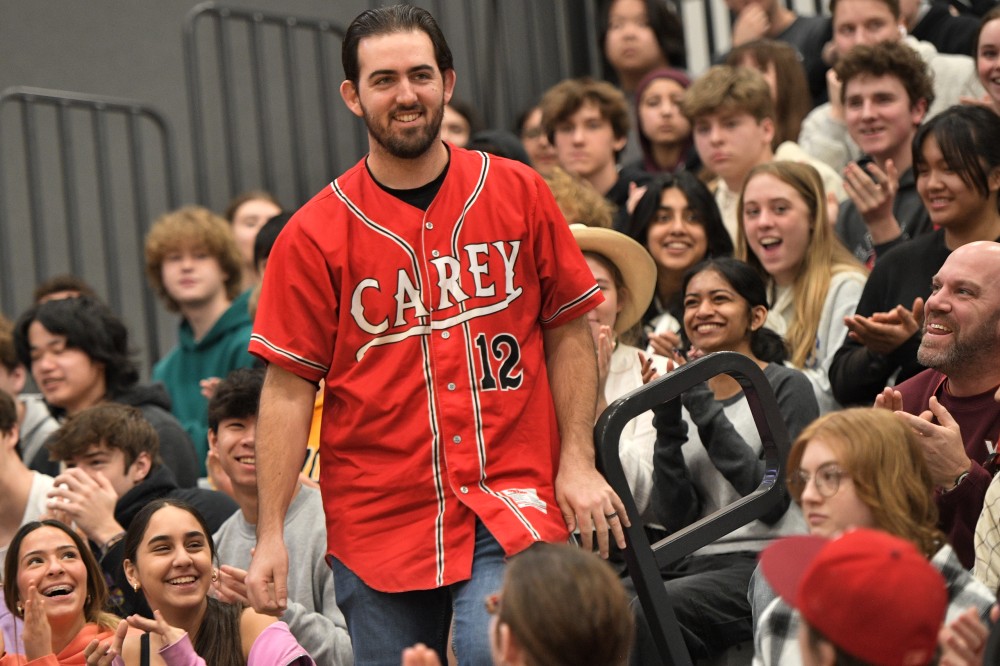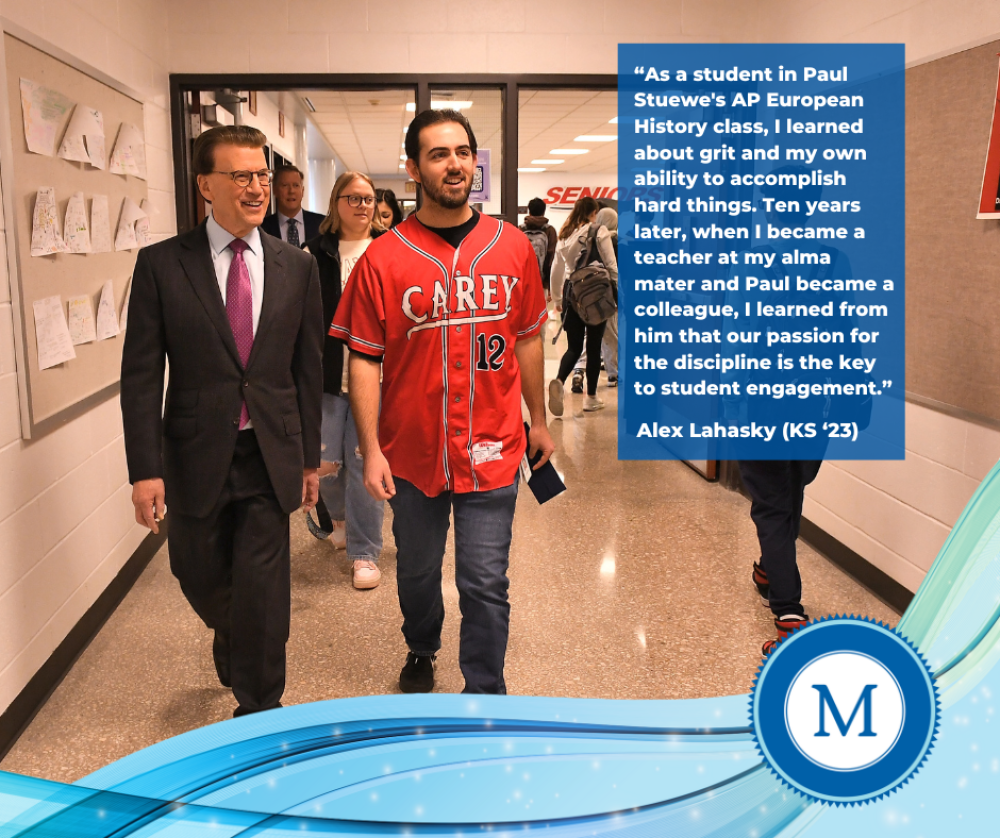Spotlight: Alex Lahasky (KS '23)
July 23, 2024
Kansas social studies teacher Alex Lahasky hopes his students continue to strive to be kind, thoughtful and civic-minded while applying the critical thinking, perspective-taking and empathy skills he models in his classroom. In his AP U.S. history course, he replaced traditional summative assessments with oral presentations on contemporary issues to enhance students' communication and practical interview skills. “Our hope is that, by encouraging the connections between past and present, our students will be well-equipped to inherit our democracy as informed voters—voters capable of drawing on the wisdom of the past while forging our future.” Alex received a 2023-24 Kansas Milken Educator Award in Overland Park on February 8, 2024.
Milken Family Foundation: How have students responded since your Milken Educator Award surprise?
Alex Lahasky (KS '23): After my notification, I was overwhelmed by the kindness and support of my school community. Of course, my students were excited for me and shared words of encouragement and congratulations—but I also had a number of students, unknown to me, stop in the hallways to do the same. It was eye-opening, humbling, and made me ever more grateful to serve the Blue Valley West community.
MFF: Who are your role models as an educator?
Lahasky: I have been privileged to have crossed paths with some incredible educators—many of whom continue to push and inspire me. Bobby Pickett was my fifth grade social studies and English teacher, and one who made every student feel welcome and excited to learn. As a student in Paul Stuewe’s AP European history class, I learned about grit and my own ability to accomplish hard things. Ten years later, when I became a teacher at my alma mater and Paul became a colleague, I learned from him that our passion for the discipline is the key to student engagement. Dr. Jonathan Brooke, my history professor and advisor at William Carey University, had such a unique ability to express the real-world importance of a sound history education, and his is an example I have been chasing ever since I sat in his classroom. Lauren Garcia was my mentor and partner teaching AP U.S. History for the first seven years of my career. More than anyone else, she taught me how to be a teacher and I owe her more than I'll ever be able to express. My colleagues in the social studies department at Blue Valley West continue to inspire me to this day. They are thoughtful, reflective, collaborative, and incredibly talented. Finally, I marvel at my wife, Jennifer Lahasky, whose ability to build courage, grit, and self-esteem in her choir students is truly uncommon.

MFF: Tell us about your first year of teaching.
Lahasky: In a word, it was a grind. Way too many early mornings and late nights. Like any first-year teacher, I experienced doubts about my ability to do the job well. No teacher education program or student teaching experience can really prepare us for the first time in a classroom of our own. I was fortunate to have the support of my principal, Dr. Brett Potts, who saw potential in me but always challenged me to be reflective and to improve my craft. Kelli Kurle, another mentor and colleague, supported me with her warm friendship and sage counsel. Credit also belongs to my students, who were no doubt perceptive to the fact that their teacher was unpolished, but trying his best. I learned much from them and continue to learn from my students every year.
MFF: What do you hope students remember from their time with you?
Lahasky: It is not lost on me that most of my students will not pursue a post-secondary degree in history like I did, but I hope that— even if history wasn't their favorite class in high school—they can grow into a love for the discipline as they mature. More importantly, though, I hope they are able to take the skills refined in my classroom: perspective-taking, critical thinking, argumentation, and empathy -- and take those skills beyond the school setting and into their community. I hope they are kind, thoughtful, and civic-minded. And I hope they remember me as a teacher who did his best to model those habits of mind.
MFF: What inspired you to replace traditional written summative assessments with oral presentations on contemporary political issues? How does this format enhance students' communication skills and connections between past and present events?
Lahasky: I use a variety of assessment methods in my classes. Many of my AP U.S. history students take the AP exam in May, so we still engage in traditional pen-and-paper assessments that demonstrate critical thinking skills, writing and argumentation, and their understanding of American historical content. But students are also assessed in weekly Socratic discussions, the topics for which stem from scholarly articles on relevant topics. For my on-level U.S. history students, the final summative assessment consists of an exit interview. My team and I first implemented this format in 2022-23 in recognition of the fact that, while not many students will go on to study history in college, nearly all of them will sit for a job interview at some point in their future. During the interview, students are asked to describe a contemporary political or social issue, and how their learning over the course of the year has influenced their understanding of the issue. For example, a student describing the role of government in today's economy might make connections to the laissez faire approach during the Gilded Age, or the interventionist approach during the Great Depression; students describing gender inequality today may draw upon their learning of the women's suffrage movement during the Progressive Era, or the civil rights movements of the 1950s-1970s. Our hope is that, by encouraging the connections between past and present, our students will be well-equipped to inherit our democracy as informed voters—voters capable of drawing on the wisdom of the past while forging our future.
MFF: Can you tell us more about the benefits of the dual enrollment partnership with Baker University for students in your history classes? How have you seen this collaboration impact their educational opportunities and college readiness?
Lahasky: Students in Advanced Placement Social Studies classes at Blue Valley West have the opportunity to earn college credit either through successful completion of the AP exam in May or through concurrent enrollment with a local university partner. Offering concurrent credit has expanded student access to college credit, as it allows students to demonstrate learning over the course of an entire semester, rather than on a single high-stakes exam. In recent years, over 90% of my AP U.S. history students have earned college credit through one of these pathways, and I am happy to be able to offer both. Students regularly graduate from Blue Valley West with a year’s (or more) worth of college credit under their belt. The academic habits they develop in these rigorous courses absolutely give them a springboard into their college experience.
MFF: What advice would you share with people who are interested in becoming teachers?
Lahasky: We need you! Along those lines, it’s time we change some of the perception around the teaching profession. Society often paints educators as selfless, giving and humble servants in a thankless profession. To be sure, these things can be true, but teachers also possess marketable skills and should exercise their leverage. Furthermore, projected teacher shortages in our state and others will increase that leverage—especially for high-performing new educators. Aside from the fact that the future of our communities relies on strong educators, the profession is a stable one and, from a worker’s perspective, now is a great time to enter it.
Watch our interview with Alex Lahasky (KS '23) on the day of his Milken Award notification:
Don’t miss any new articles and updates from Milken Educator Awards:


